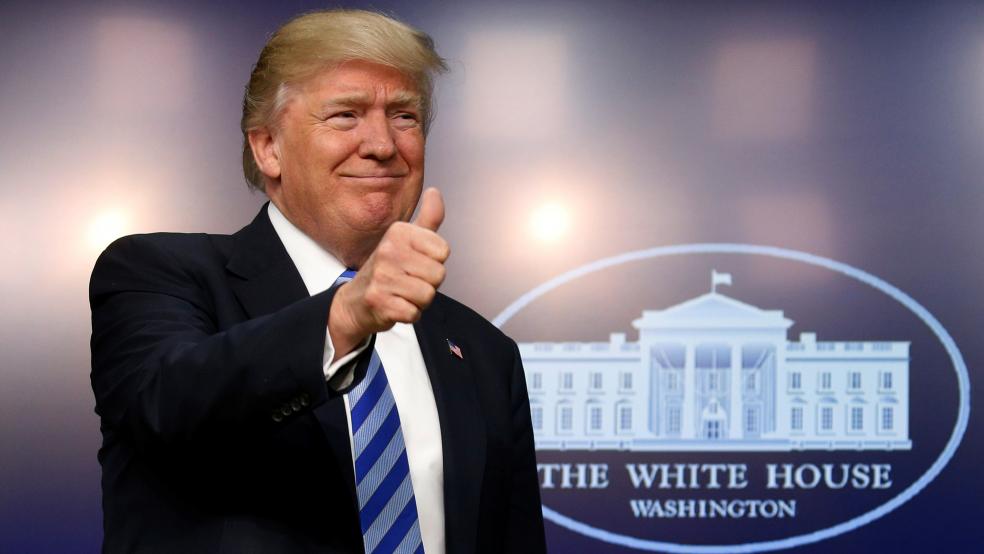The chances of the average American being able to file their taxes on a postcard this time next year are getting smaller by the day.
The Trump administration, once hopeful that it would see a substantive tax reform bill ready to move through Congress and to the president’s desk by the end of August, is effectively ditching that deadline, according to the Associated Press. The existing framework — a sort of Frankenstein’s monster of different proposals and pet projects — is being tossed aside to allow the White House and lawmakers to make a fresh start, the news wire reported on Monday.
Related: How GOP Conservatives Could Make Tax Reform Impossible
In comments to Bloomberg, White House National Economic Council Director Gary Cohn confirmed that the schedule is now more flexible. “Getting it done well and getting it done right is more important than getting it done soon. We are committed to getting it done this calendar year.”
President Trump campaigned on a promise to completely overhaul the tax code and lower taxes for everyone while simultaneously funding a $1 trillion infrastructure program and a huge increase in spending on the military, all without raising the federal debt. He also promised to greatly simplify the process of filing taxes by eliminating many deductions and loopholes.
As in the case of reforming the health insurance market, though, it seems tax reform will be more complicated that the president anticipated.
The Trump White House has already suffered one major legislative setback in the failure of its promise to repeal and replace the Affordable Care Act. In that case, the administration adopted a plan that was largely concocted by House Republican leaders, and Trump officials found themselves in the position of advocating an immensely unpopular bill that couldn’t even pass with a GOP majority in the House.
Related: Chair of Freedom Caucus Open to Deficit-Expanding Tax Cuts
There seems to be an effort underway to avoid repeating some of those problems with the tax legislation. For one, the White House has signaled that it plans to play an active role in the development of the proposal, and unlike its previous legislative effort, it will bring some people with relevant experience to the task.
The White House is staffed with former investment bankers who are bound to have strong opinions on the question of business taxes. Trump also just named Kevin A. Hassett of the American Enterprise Institute to chair his Council of Economic Advisers. Tax policy is one of Hassett’s main areas of interest.
So far, the existing tax plan has been a smorgasbord of disparate ideas and trial balloons, many of which appeal strongly to people with strong ideological points of view but might struggle to find broad support on their own.
There is wide agreement among both the White House and lawmakers on the need to slash or even eliminate corporate taxes. House leadership, for example, has been pushing a plan to replace the tax on corporate profits with a tax on imported goods and raw materials intended to spur domestic production.
Related: Will Trump Gamble on a Border Tax and Anger Millions of Walmart Shoppers?
Trump himself has said that he is interested in imposing import taxes on goods on a country-by-country basis, generally in line with how fairly he believes other countries treat exports coming from the United States. Both of those proposals would likely drive up some prices for U.S. consumers.
Another factor that may have worked itself into the decision to start from scratch and hammer out a bill with Congress was the warning from the House Freedom Caucus last week that it is not willing to tolerate another major bill — like the health care proposal — that is written behind closed doors.
In an obvious shot across the bow, Freedom Caucus Chair Rep. Mark Meadows of North Carolina toled Republican leaders not to spring a bill on his members at the last moment: “When a member sees the text for the first time in a leaked draft from Politico, therein is a problem.”
Because the Freedom Caucus has the power to scuttle any bill the GOP tries to pass with only Republican votes, it’s going to be difficult to deny them a seat at the table, and this delay may be a way for Trump and House leadership to signal that they are letting multiple factions within the party have a voice from the beginning of the process.
Related: Why Budget Hawks Want to Keep Obama’s ‘Cadillac Tax’
Whatever the motivation, restarting the process in April with the hope of wrapping it up by year-end seems extremely optimistic, given the legislative knife-fight that any major tax reform proposal is guaranteed to become once plans start to produce winners and losers. After all, the last major tax reform bill happened in 1986, and it took years to hash out. There’s a reason why it hasn’t been successfully tried again since.
That whole filing on a postcard thing may be a few tax seasons away.





